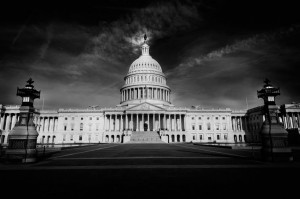On the Hill: RFRA Was Good. Now It’s Bad. Will Congress Change It?

Last Thursday I attended a packed congressional briefing at the US Capitol that attempted to explain what exactly the Religious Freedom Restoration Act (RFRA) is, what its intended purpose was, and how its current incarnation threatens both religious liberty and the fight against discrimination.
According to several expert panelists at the briefing, the original intent of RFRA was to protect minority religious rights in the wake of several controversial court rulings. The most important of these cases, Employment Division v. Smith, found that the Constitution did not protect two American Indians who ingested peyote as part of religious ceremonies conducted by the Native American Church from getting fired. RFRA was an attempt by Congress, with the support of both progressive organizations and conservative religious groups, to make sure that the religious rights of these minority religious groups are protected, even if the law prohibits certain activities (such as illegal drug usage).
What RFRA has now become doesn’t have anything to do with the restoration of minority religious rights, but with the creation of a new and flawed standard for religious liberty that gives special benefits to certain for-profit businesses and individuals who wish to discriminate against others. One of the panelists, Marci Hamilton, Paul R. Verkuil Chair of Public Law at the Benjamin N. Cardozo School of Law and the recipient of the American Humanist Association’s Religious Liberty Award this year, noted that RFRA has fundamentally changed the judicial test for religious liberty to disproportionately benefit the believer at the expense of others. This new standard is applied to almost every law, including the Violence Against Women Act, which does not deal with religious groups or religious liberty.
The federal law has now been used as a justification for businesses to not meet their healthcare obligations under the Affordable Care Act, leaving thousands of women without access to contraception. State versions of RFRA, such as those passed in Mississippi and Indiana, would allow individuals to discriminate against each other for religious reasons. As Paresh Dave of the Los Angeles Times notes, “A healthcare worker could use the new state law to help defend his or her decision in court to deny fertility treatments to a lesbian couple because it would be in conflict with the worker’s religious beliefs.” And as the infamous “Pizzagate” showed us, businesses which accommodate the public can refuse to provide their services for gay couples simply because of their sexual orientation and can use the state RFRA law in court to prevent civil action against them.
Whether it’s forcing employees to essentially pay for their employer’s faith when it comes to healthcare coverage or giving a special right to discriminate to religious individuals, the Religious Freedom Restoration Act has truly become Frankenstein’s monster, something so grotesque and frightening that the original intent behind it is lost.
What should be done about RFRA now? Should the law be repealed so that these concerns regarding discrimination are abated, even if certain practices by minority religious groups would no longer be explicitly protected? Or should the law be reformed so that its original intent is realized?
For most of the panelists at the event, RFRA has outlived its utility and should be relegated to the dustbin of history. There is simply too much to fix and too much room for a flawed interpretation by the judiciary even if the bill is reformed.
Sadly, these laws are unlikely to go anywhere anytime soon as the political will for such an action is relatively nonexistent—at least at the federal level and in most of the states—until cases of discrimination go public and cause an outcry strong enough to merit legislative action. Still, as the LGBTQ and nonreligious communities become more mainstream and increase their political influence, advocacy against passing new state RFRA bills could at least stem the tide of government-sanctioned religious discrimination until the state and federal laws are removed. As John Mayall & the Bluesbreakers once said, “The laws must change one day, but it’s goin’ to take some time.”
